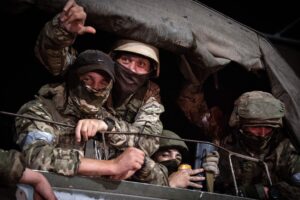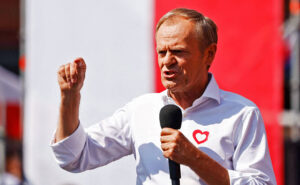Kremlinology is like reading tea leaves or astrology. It is closer to an art than a science — little is as it seems, and what information does trickle out has often only been released to service further palace intrigue. Nearly three weeks after Yevgeny Prigozhin’s Wagner rebellion, the Kremlin is doing everything in its power to project a façade of resilience and normality. But nothing could be further from the truth. And despite the opacity of Moscow politics, some fundamental threats to Putin (of which Prigozhin is only a particularly grisly manifestation) are beginning to emerge.
Putin is now engaged in a power struggle on three fronts: against the still-lingering forces of Prigozhin and Wagner; against discontents within his own military hierarchy; and against the Russian public itself which, spurred on by nationalist influencers, have proven themselves far from loyal to the regime. Putin knows that Prigozhin’s rebellion could open a Pandora’s Box of pretenders and uprisings for the rest of his reign. But at a deeper level, the nationalist Right, for whom Prigozhin has become the favoured avatar, now offers an alternative to Putin’s monopoly on political thought in Russia. And this is a far more fundamental threat to Putinism — the emergence of an ideological movement to challenge the stranglehold he has maintained on Russia’s political culture for a generation.
Far from defeated, Prigozhin now stands as a symbol of future defiance. Though his coup failed to topple the Russian Defence Ministry, for now his Wagner Group continues to operate outside of the military establishment. And though the Russian authorities have already begun to dismantle his personal commercial empire, Prigozhin is far from penniless: Belarus’s Alexander Lukashenko confirmed that he had arrived in St Petersburg to claim billions in cash assets and personal weapons that had been seized, while authorities cleared him of financial responsibility for the rebellion. The balance of power between him and his President is therefore unclear, with Putin clearly unable to clear or quash him. This week, the Kremlin confirmed that Prigozhin met with Putin after the uprising “and pledged loyalty to the Government” — messaging that contrasts sharply with the continuing demonisation of the Wagner leader in the Russian media.
The contradictory narratives around Prigozhin’s future continue to pile up. But for now, he remains active and substantially autonomous. In a recent broadcast, he stated that Wagner fighters would be back on the frontlines in Ukraine soon, in direct contravention of his deal with Putin, which stipulated that Wagner would relocate to Belarus. The group reportedly continued to recruit new fighters in Russia for some time after the rebellion, before finally announcing it would pause as it withdrew from the country — which reportedly has yet to materialise. All of this amounts to a highly frustrating set of circumstances for Putin. He has been reduced to chipping away at Prigozhin’s power instead of confronting him. And this demonstrates his continuing dependence on Wagner: he understands the role the group has played in Ukraine, and would rather reorganise than disband it so as to maintain its influence in Africa, the Middle East, and elsewhere.
So Wagner remain a dormant but present threat. But more proximate are the copycat-rebels Prigozhin may inspire from elsewhere in Putin’s administration. It was evident from the moment that Wagner captured Rostov-on-Don without any resistance and embarked on its march toward Moscow nearly unopposed that Prigozhin may have had help on the inside — a notion that is more terrifying for Putin than the rebellion itself. There are claims that General Sergei Surovikin, one of the most senior members of Putin’s military brass, knew of Prigozhin’s plans in advance. And since the revolt, documents have emerged showing that he and 30 other high-ranking military and intelligence officials had been secret “VIP members” of Wagner since 2018. Surovikin has not been seen in public since he released a video during the rebellion, leading US intelligence reports to suggest he may have been detained or arrested. Other military leaders, such as Deputy Defence Minister Yunus-bek Yevkurov, who was filmed negotiating with Prigozhin in Rostov (potentially under duress), were also conspicuously absent from recent broadcasts by the Ministry’s leadership this week.
At the very least, the rebellion has exacerbated divisions within the Russian security state, while the influential Russian military blog Rybar, founded by a former Defence Ministry press officer, claims that Putin is in fact executing a “purge”. The scale will remain obscure until Putin is finished, but given the circumstances, a significant reorganisation must be taking place in which personal loyalty to Putin will become the chief currency. Putin has always privileged fealty over competence — Surovikin, a well-regarded military commander who once headed Russia’s operations in Ukraine, was later replaced by Gerasimov, who, despite being widely seen as incompetent by many Kremlin critics including Prigozhin, has served as a faithful foot soldier for his President. For what Putin truly fears is lack of control over his circle of strongmen, the so-called siloviki.
But, rare for an aspiring autocrat, the last front on which Putin has been forced to defend himself is in the theatre of public opinion. In a recent interview with The New Yorker, analyst Tatiana Stanovaya correctly pointed out that Putin has never derived his authority from the Russian people. Nonetheless, public perception still matters, because any form of dissent undermines the central narrative of Putinism: that the only way to secure Russia’s historically justified status as first among nations is through allegiance to Putin and his circle.
Not only did Prigozhin publicly speak out against Putin’s establishment from the outside, but in his broadcasts he often spoke directly to the Russian public. In doing so, he violated another pillar in Putin’s power — the idea the Russian people should remain depoliticised and allow the authorities manage the country as they see fit. The sight of civilians in Rostov greeting Wagner with open arms and shaking Prigozhin’s hand is a spectacular affront to this. And, according to the Levada Center, one of the largest independent polling organisations left in Russia, support for Wagner sat at 58% in the days leading up to its rebellion, including the day when Prigozhin laid out why he believed the Ukraine war had been started for corrupt reasons. Although this support dropped on the day of the rebellion, it continued to hover around 30% for days afterward, despite near-universal denunciations of Prigozhin on mainstream Russian media.
In tandem with these media attacks, Putin has also apparently felt compelled to demonstrate that he can also command the allegiance from ordinary Russians. In a somewhat uncharacteristic move after his long years of isolation during the pandemic, Putin appeared in front of a doting crowd in Derbent in the Republic of Dagestan, on the southern fringes of the Russian Federation. The Wagner rebellion has changed the rules of the game, and Putin has been forced to adapt. But it’s not the disorganised masses of far-flung Derbent that Putin is most concerned about.
After quashing the last vestiges of Russia’s liberal opposition, and successfully entrenching his historically-informed vision of traditionalist Russian nationalism, Putin positioned himself as the ideological north star of modern Russia. But as the war in Ukraine exposed his inabilities to deliver on that vision, this hegemony began to crack, and the same nationalists Putin had inspired soon took note. Prigozhin gave voice to many of these concerns about the management of the war, including from sub-regime agitators such as Rybar. Now, Rybar and other influencers are bristling at the Kremlin’s campaign to discredit Wagner’s achievements in Ukraine, and are picking fights with a Russian Ministry of Defence that is increasingly frustrated with its inability to get these milbloggers to fall in line with the official narrative. Offline, too, support for Wagner continues to fester, as students brandishing the group’s flags in Moscow earlier this month demonstrated.
For Putin, the Wagner rebellion destabilised the ground beneath him as much as it did the walls around him. Though his public responses have appeared restrained so far, the better to project an image of calm, his command is no longer absolute. Even if he is able to neutralise Prigozhin and bring Wagner under his own control, the threat from within the Kremlin and from the nationalist grassroots will remain. And far from an aberration, Prigozhin’s coup may be looked back upon as a turning point, the first link in a concatenation of coups, counter-coups and civil wars, all-too bloodily familiar to Russia and its people.
Disclaimer
Some of the posts we share are controversial and we do not necessarily agree with them in the whole extend. Sometimes we agree with the content or part of it but we do not agree with the narration or language. Nevertheless we find them somehow interesting, valuable and/or informative or we share them, because we strongly believe in freedom of speech, free press and journalism. We strongly encourage you to have a critical approach to all the content, do your own research and analysis to build your own opinion.
We would be glad to have your feedback.
Source: UnHerd Read the original article here: https://unherd.com/



